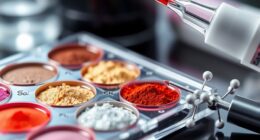To build a successful chemistry resume, focus on highlighting your lab skills with advanced equipment like HPLC, GC-MS, and spectrophotometers, emphasizing precise analysis and troubleshooting. Showcase measurable research results, such as improved efficiency or cost savings, using action words and quantifiable data. Tailor your skills and keywords to specific job descriptions, keep the layout clear and industry-focused, and strategically present your education and certifications. Continue exploring these tips to craft a standout application that captures employer attention.
Key Takeaways
- Tailor your resume with industry-specific keywords like chromatography, spectroscopy, and formulation to pass applicant tracking systems.
- Highlight measurable achievements such as increased efficiency, cost savings, or research milestones to demonstrate impact.
- Showcase laboratory skills with advanced equipment proficiency, analytical techniques, and adherence to safety and compliance standards.
- Structure your resume using a clear, concise format with action verbs, quantifiable results, and relevant certifications.
- Emphasize educational background, research projects, and continuous learning resources to reflect ongoing professional development.
Highlight Your Laboratory Skills and Techniques Effectively

To effectively highlight your laboratory skills and techniques on your chemistry resume, focus on showcasing your proficiency with advanced equipment, analytical methods, and sample preparation. Mention your experience operating instruments like HPLC, GC-MS, spectrophotometers, and titrators, emphasizing your ability to perform precise chemical analyses. Highlight your skills in maintaining and calibrating devices following SOPs to guarantee accuracy and safety compliance. Detail your troubleshooting expertise, diagnosing and resolving equipment malfunctions efficiently. Include your experience documenting usage logs and adopting new technologies through training. Showcase your familiarity with analytical techniques such as UV-Vis, chromatography, and titration, along with your ability to validate testing protocols and interpret complex datasets. Demonstrating these skills assures your technical competence stands out to hiring managers. Additionally, understanding the integration of AI in laboratory processes can further enhance your efficiency and innovation in the lab.
Showcase Measurable Research Impacts and Achievements

Highlighting your research impacts with measurable results demonstrates your ability to deliver tangible outcomes. For example, you might showcase how you achieved up to 98% enantiomeric excess in catalytic reactions or increased analytical screening throughput by 30%. Quantify cost savings, such as reducing API production expenses by 20% or waste by 40%, and highlight project timelines you shortened—like accelerating drug candidate development by four months. Mention your consistent compliance, such as maintaining 100% FDA adherence over two years. Including color accuracy in your research portfolio can demonstrate your familiarity with precise data interpretation and visualization techniques. Showcasing funding successes, like securing over $500,000 in grants for green chemistry, and highlighting peer-reviewed publications and patents that demonstrate your scholarly contributions are also essential. Utilizing state-of-the-art paint sprayer technology can also showcase your familiarity with advanced research tools, further emphasizing your comprehensive expertise. Incorporating glycolic acid into your research portfolio can demonstrate your adaptability to innovative and effective chemical solutions. Additionally, emphasizing your proficiency with analytical techniques can underscore your capability to generate accurate and reliable data essential for impactful research outcomes. Recognizing the importance of spiritual insights from angel numbers can enhance your understanding of personal growth and transformation, which can positively influence your professional development. These concrete achievements prove your research expertise, impact, and value to potential employers.
Tailor Your Skills and Keywords to Specific Job Descriptions

Ever wondered how to make your chemistry skills stand out to specific employers? Customizing your skills and keywords is vital. Start by analyzing the core technical competencies listed in the job description, such as chromatography, spectroscopy, or formulation development. Highlight your domain expertise—whether organic, medicinal,, or process chemistry—and include instrumentation proficiency like HPLC, GC-MS, or NMR. Incorporate relevant industry-specific keywords, matching exact terms and phrasing used in the posting, such as “research and development” or “equipment troubleshooting.” Stay informed about current industry trends, like infrastructure safety concerns, to demonstrate your awareness of broader technical issues that may impact your field. Understanding GMC tuning concepts can also showcase your ability to optimize processes and improve operational efficiency in laboratory settings. Additionally, being familiar with the latest TikTok trends can help you craft engaging content that highlights your technical expertise creatively, which can be particularly useful for modern branding and networking. Developing an understanding of zodiac sign compatibility can sometimes provide insight into team dynamics and interpersonal relationships in collaborative environments. Incorporating knowledge of industry advancements can further demonstrate your commitment to staying current with evolving technologies and techniques. Balance hard skills, like analytical chemistry and data analysis, with soft skills such as communication and problem-solving. Use ATS-friendly tactics by repeating essential keywords naturally, leveraging industry jargon, and including certifications like ACS or Six Sigma. This targeted approach guarantees your resume resonates with both recruiters and ATS algorithms.
Structure Your Accomplishments Using Action-Oriented Methods

Structuring your accomplishments with action-oriented methods makes your chemistry resume more compelling by clearly demonstrating your contributions and impact. Use strong action verbs like accelerated, analyzed, devised, directed, and streamlined to highlight your role in achieving results.
Quantify your achievements with metrics such as cost savings, productivity increases, or success rates, like a 3% boost in production or 100% success in a drug development project.
Emphasize your technical expertise by mentioning analytical techniques, specialized equipment, and research methodologies. Incorporating knowledge of Glycolic Acid Benefits for Skin can demonstrate your ability to research and incorporate relevant scientific information into your work. Additionally, understanding headphone compatibility with devices can showcase your familiarity with integrating scientific concepts into practical applications.
Showcase problem-solving skills through innovations, process improvements, and troubleshooting. Additionally, highlighting innovative research techniques can further strengthen your profile by illustrating your adaptability and dedication to scientific advancement.
Finally, incorporate soft skills like teamwork, leadership, and communication to present a well-rounded picture of your capabilities. Structuring accomplishments this way makes your resume clear, impactful, and tailored to hiring managers’ expectations.
Present Educational Credentials and Certifications Strategically

Presenting your educational credentials and certifications strategically guarantees that hiring managers quickly see your qualifications and strengths relevant to the chemistry field. Start with your most relevant degrees, listing the degree, field, university, location, and graduation year clearly. Position these at the top of the credentials section to catch attention immediately. Include any academic honors, specializations, or research projects that highlight your expertise. When listing certifications, specify the certification name, issuing organization, and year earned, emphasizing those pertinent to chemistry. If applicable, add relevant coursework, research, or awards that demonstrate your skills and commitment. To stand out further, showcase your familiarity with industry-specific testing tools and methodologies that support quality assurance in scientific environments. Understanding the symptoms of breast cancer can be crucial in certain health-related roles within the industry, so mentioning relevant knowledge can be advantageous. Additionally, demonstrating knowledge of remote work productivity techniques can indicate adaptability in modern work settings. Incorporating knowledge of laboratory safety protocols and compliance standards can further strengthen your profile. Regularly update this section to reflect new achievements, maintaining clarity and professionalism throughout. Being aware of current industry trends and how they impact hiring priorities can also give you a competitive edge.
Optimize Your Resume Layout for Clarity and Industry Relevance

Organizing your resume layout effectively helps hiring managers quickly identify your qualifications and industry relevance. Start with a clear header that includes your full name, professional email, phone number, location, and LinkedIn profile.
Choose a straightforward, single-column layout focused on readability over flashy design. Use a reverse chronological format to emphasize your recent work experience, especially for chemistry roles.
Keep your resume concise—one page for entry-level, two pages for experienced professionals—and tailor it to the industry with relevant sections like a professional summary, work experience, skills, publications, and certifications. Incorporating industry-specific keywords can also improve your resume’s visibility in applicant tracking systems.
Use bullet points with strong action verbs and include measurable achievements. Maintain consistent formatting and standard fonts to ensure clarity. Additionally, selecting professional layout options that adhere to industry standards can enhance your presentation.
Avoid distractions and keep the layout clean to highlight your most relevant qualifications effectively.
Frequently Asked Questions
How Can I Effectively Incorporate Soft Skills Into My Chemistry Resume?
You can effectively incorporate soft skills into your chemistry resume by linking them to measurable achievements, like boosting lab efficiency or managing deadlines.
Use active language to highlight leadership and collaboration, and tailor skills to the job description.
Quantify your communication abilities with metrics, such as conference presentations.
Including specific examples in your achievements and a dedicated strengths section showcases your problem-solving and adaptability, making your soft skills stand out.
What Are the Best Ways to Highlight Interdisciplinary Collaboration Experiences?
Imagine showcasing a vibrant web of collaboration on your resume, where each connection tells a story. You can highlight your interdisciplinary teamwork by detailing projects with R&D, quality control, and clinical teams, emphasizing accelerated timelines, optimized methodologies, and compliance achievements.
Mention leadership roles, conflict resolution, and process improvements. Quantify your impact—like cost reductions or milestone advancements—and include examples of training or knowledge transfer, painting a clear picture of your ability to bridge diverse expertise for organizational success.
How Should I Address Gaps or Career Changes in My Chemistry Resume?
When addressing gaps or career changes, be honest but concise. Focus on skills gained during gaps, like volunteering or freelancing, and highlight how they relate to your new goals.
Tailor your resume to emphasize transferable skills and relevant experiences, even if from different fields. Show confidence and a positive attitude, demonstrating your adaptability and commitment to growth.
This approach helps you present yourself as a strong, versatile candidate ready for new challenges.
What Are Common Mistakes to Avoid When Listing Laboratory Techniques?
When listing laboratory techniques, avoid being vague or generic, like just saying “lab work.” Be specific about methods, equipment, and standards you followed, such as “performed HPLC analysis using ISO 17025 protocols.”
Don’t overstate skills or mix academic and industrial standards without clarification. Use clear, industry-relevant keywords, and highlight safety procedures and troubleshooting skills with concrete examples to showcase your true expertise effectively.
How Can I Tailor My Resume for Non-Research Industry Roles?
You should tailor your resume by emphasizing practical skills like equipment maintenance, chemical handling, and process optimization. Use industry-specific terminology and highlight your experience in quality control, GMP compliance, and technical documentation.
Focus on transferable skills such as problem-solving, communication, and leadership. Customize your work descriptions to match the job requirements, and organize your resume clearly, showcasing achievements that demonstrate your ability to contribute to non-research roles in industry.
Conclusion
By mastering these resume strategies, you’ll turn your chemistry background into a powerhouse that commands attention. Your skills will shine brighter than a lab’s Bunsen burner, and your achievements will stand out like a glowing reagent. With a perfectly crafted resume, you won’t just land a job—you’ll dominate the industry. Get ready to transform your career from ordinary to extraordinary, because in this game, your resume is the ultimate catalyst for unstoppable success.









